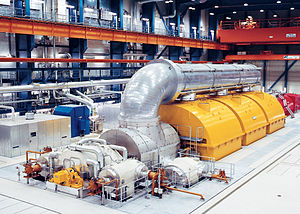
Electricity generation is the process of generating electric power from sources of primary energy. For electric utilities, it is the first process in the delivery of electricity to consumers. The other processes, electricity transmission, distribution, and electrical power storage and recovery using pumped-storage methods are normally carried out by the electric power industry. Electricity is most often generated at a power station by electromechanical generators, primarily driven by heat engines fuelled by combustion or nuclear fission but also by other means such as the kinetic energy of flowing water and wind. Other energy sources include solar photovoltaics and geothermal power.
The fundamental principles of electricity generation were discovered during the 1820s and early 1830s by the British scientist Michael Faraday. This method is still used today: electricity is generated by the movement of a loop of wire, or disc of copper between the poles of a magnet. Central power stations became economically practical with the development of alternating current power transmission, using power transformers to transmit power at high voltage and with low loss. Electricity has been generated at central stations since 1882. The first power plants were run on water power or coal, and today rely mainly on coal, nuclear, natural gas, hydroelectric, wind generators, and petroleum, with supplementary amounts from solar energy, tidal power, and geothermal sources. The use of power-lines and power-poles have been significantly important in the distribution of electricity.